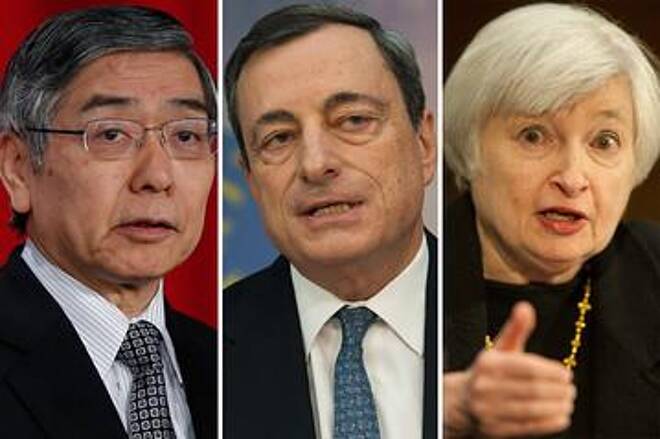Advertisement
Advertisement
Feds, BoJ & ECB All Verbal This Week
By:
Mario Draghi has been hitting the speaking circuit trying to help the euro and the Eurozone economy with words instead of actions. Stocks around the globe
Today markets will hear from top level Federal Reserve decision makers. Fed Chair Janet Yellen, Fed Vice Chair Stanley Fischer, and New York Fed President William Dudley will all be heard from today. If the Fed is going to begin tightening in December, you would at least expect Fischer and Dudley to begin laying the groundwork now. The dollar continued to rally trading at 97.37 up by 12 points.
In an interview over the weekend, Draghi said his years in office so far have “certainly have been eventful and marked by profound changes to the structure of monetary policy.” He also called the euro area’s situation over that period “extraordinary.”
Draghi’s overriding concern so far has been to protect the 19-nation bloc from a Japan-style protracted period of stagnating or falling prices and declining growth potential.
Yet despite record-low interest rates, long-term loans to banks and a 1.1 trillion-euro ($1.2 trillion) asset-purchase plan, he hasn’t succeeded in returning inflation to the goal. Now, faced with a fragile recovery at risk from weaker global trade, a euro that may be too strong for the economy and the risk of a slump in energy prices, he’s holding out the prospect of another round of monetary easing in December. That’s when new forecasts will show whether the inflation goal is receding still further. The ECB predicted in September that euro-area inflation would accelerate to 1.7 percent in 2017. The rate was zero in October. The euro is down 15 points on Wednesday morning at 1.0949. The European Central Bank’s policymakers will review the degree of monetary stimulus they have deployed when they meet in December and remain willing and able to act if needed, ECB President Mario Draghi said on Tuesday. “Even though domestic demand remains resilient, concerns over growth prospects in emerging markets and other external factors are creating downside risks to the outlook for growth and inflation,” he told a European cultural event in Frankfurt.
Moving to the Asian markets on Wednesday, the Aussie gained 16 points against the stronger US dollar. The Aussie is trading at 0.7202 after retail sales came in much higher than expected. The seasonally adjusted result was in line with expectations and follows another 0.4 per cent rebound in August after sales fell in July. However, on an annualized basis sales growth slipped back marginally to 3.6 per cent.
On the opposite side of the coin the kiwi tumbled 11 points after the Dairy Auction prices dropped. The kiwi is trading at 0.6654. The kiwi weakened as traders favoured the greenback, betting US economic data broadly in line with expectations will prompt a hike in US interest rate hike next month. A 7.4 percent drop in average prices at the GDT auction overnight also weighed on the kiwi, as increased production from Europe and subdued demand keeps a lid on prices.
The Japanese yen traded at 121.18 gaining 11 points as the US dollar gained. Traders are waiting for Friday to hear from Bank of Japan governor. Against the euro the yen is holding at 132.67.
While the US Federal Reserve contemplates a finely balanced decision about whether to raise interest rates in December, its Japanese counterpart is being forced the other way. Last Friday the Bank of Japan decided to leave monetary policy unchanged. But it also revised down its inflation and growth forecasts, and pushed back its expectation of hitting the 2 per cent inflation target to the end of next year. It seems likely, and indeed desirable, that the BoJ will be forced to expand its program of quantitative easing before too long. Markets remained firmly fixed on Friday’s US non-farm payrolls report and whether the data will support the case for the Federal Reserve to hike interest rates in December. Before Friday’s non-farm payrolls, the markets will have a chance to gauge the health of the US economy through the ADP employment data and the ISM report on services sector sentiment due later in the session.
About the Author
Barry Normanauthor
Advertisement
